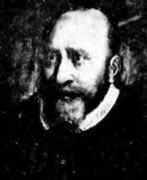Person: Recorde, Robert

Recorde was a Welsh doctor and mathematician who invented the "equals" symbol '=' which appears in his book _The Whetstone of Witte _ (1557).
Mathematical Profile (Excerpt):
- It is likely that following his election to a fellowship in 1531 Recorde taught at Oxford for a few years but there are no records to prove this.
- The next that we know for certain is that he went to Cambridge and studied there for his M.D. There is a record at Cambridge which states that Recorde received a license in medicine in Oxford twelve years earlier and this almost certainly means that Recorde received the degree of B.M. from Oxford although again no record of this has been found.
- Recorde was in London, practicing medicine at the time of Edward's succession.
- In the following year the privy council asked Recorde to examine someone who had been imprisoned in the Tower of London charged with claiming to be a false prophet.
- In 1549 Recorde was appointed controller of the Bristol mint.
- He tried to get money diverted to support his army in this venture but Recorde refused on the grounds that the orders were not from the King.
- Herbert accused Recorde of treason, removed him from control of the Bristol mint which ceased production.
- Recorde was confined to the court for sixty days.
- In 1551 Recorde was back in favour for he was appointed by the King to be general surveyor of the mines and monies in Ireland.
- When we say that Recorde was back in favour, it must be understood that his quarrel with Sir William Herbert had never been settled and there continued to be animosity between the two.
- The silver mines in Wexford did not become a successful venture for Recorde.
- The Earl of Pembroke certainly did not give Recorde support and by 1553, with the mines showing a loss, the project was closed down and Recorde was recalled to England.
- It was really a very stupid move on Recorde's part, therefore, when in 1556 he attempted to charge Pembroke with misconduct in order to regain his court position.
- Of course it is almost certain that Recorde had a valid case against Pembroke but there was no way that someone so close to Mary and Philip would allow a minor civil servant like Recorde to get the better of him.
- Pembroke countered Recorde's charges by suing Recorde for libel, the bill being served on 16 October 1556.
- The hearing took place in January 1557 and, almost inevitably, the Earl of Pembroke won his action against Recorde.
- The award of £1000 which Recorde was ordered to pay to Pembroke was made on 10 February.
- Either Recorde could not pay this sum, or he chose not to, for he was imprisoned.
- If indeed he could not pay it was doubly unfortunate for Recorde since he was owed exactly this amount for his services in Ireland which he had never received.
- If Recorde showed little common sense in his argument with the Earl of Pembroke, this was in stark contrast to the remarkable good sense and learning which he showed in all his academic work.
- Recorde virtually established the English school of mathematics and first introduced algebra into England.
- Anyone who reads Recorde's works will be led to believe that, although no evidence survives, he must have taught for some time since he has a deep understanding of how to teach.
- In 1552 Recorde published a second enlarged version of The Grounde of Artes extending the work of the first edition to rational as well as whole numbers and including such topics as 'false position'.
- In 1551 Recorde wrote Pathwaie to Knowledge which some consider an abridged version of Euclid's Elements .
- No proofs are given in this book but instead Recorde explains why the theorems are true and gives examples to aid a student to understand not only what was being taught, but also why it was being taught.
- It is therefore essentially a mathematical work on the sphere and Recorde certainly read works by Ptolemy, Proclus, Sacrobosco and Oronce Fine before writing his text.
- It is in this work that Copernicus's heliocentric theory is mentioned, and although Recorde does not say that he himself believes the theory, many historians feel that he probably did.
- It may be that here Recorde showed more common sense than he did over the Pembroke affair of 1556, and chose not to commit himself to Copernicus's theory.
- It is actually a clever pun by Recorde which, sadly, is incomprehensible to people today without explanation.
- It seems that Recorde advised the Muscovy Company on navigation.
- In his study of quadratic equations, Recorde does not allow solutions which are negative, but he does allow negative coefficients.
Born 1510, Tenby, Wales. Died 1558, London, England.
View full biography at MacTutor
Tags relevant for this person:
Origin Wales, Puzzles And Problems
Thank you to the contributors under CC BY-SA 4.0! 

- Github:
-

- non-Github:
- @J-J-O'Connor
- @E-F-Robertson
References
Adapted from other CC BY-SA 4.0 Sources:
- O’Connor, John J; Robertson, Edmund F: MacTutor History of Mathematics Archive
